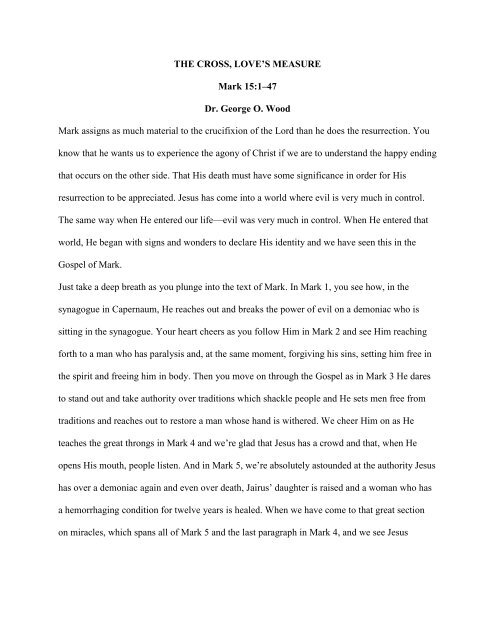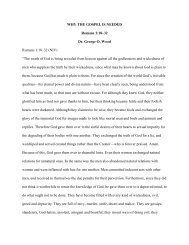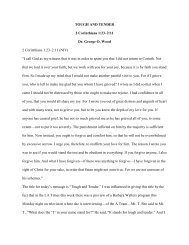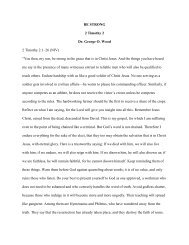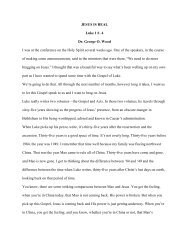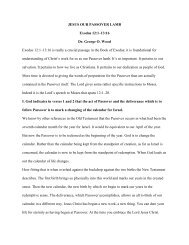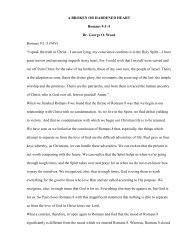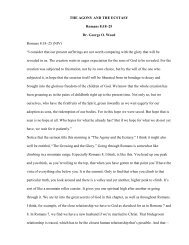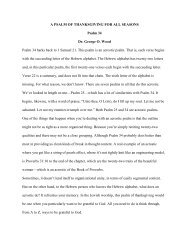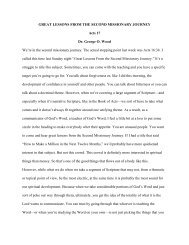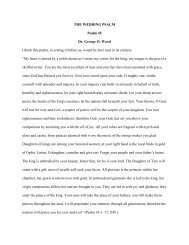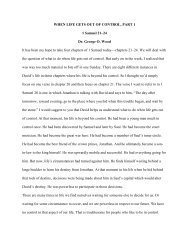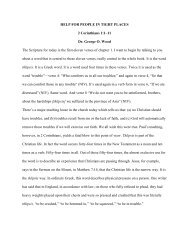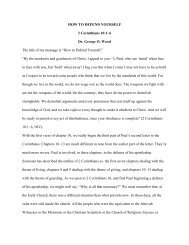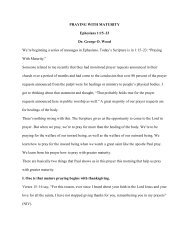13 THE CROSS, LOVE'S MEASURE.pdf - Dr. George O. Wood
13 THE CROSS, LOVE'S MEASURE.pdf - Dr. George O. Wood
13 THE CROSS, LOVE'S MEASURE.pdf - Dr. George O. Wood
Create successful ePaper yourself
Turn your PDF publications into a flip-book with our unique Google optimized e-Paper software.
<strong>THE</strong> <strong>CROSS</strong>, LOVE’S <strong>MEASURE</strong>Mark 15:1–47<strong>Dr</strong>. <strong>George</strong> O. <strong>Wood</strong>Mark assigns as much material to the crucifixion of the Lord than he does the resurrection. Youknow that he wants us to experience the agony of Christ if we are to understand the happy endingthat occurs on the other side. That His death must have some significance in order for Hisresurrection to be appreciated. Jesus has come into a world where evil is very much in control.The same way when He entered our life—evil was very much in control. When He entered thatworld, He began with signs and wonders to declare His identity and we have seen this in theGospel of Mark.Just take a deep breath as you plunge into the text of Mark. In Mark 1, you see how, in thesynagogue in Capernaum, He reaches out and breaks the power of evil on a demoniac who issitting in the synagogue. Your heart cheers as you follow Him in Mark 2 and see Him reachingforth to a man who has paralysis and, at the same moment, forgiving his sins, setting him free inthe spirit and freeing him in body. Then you move on through the Gospel as in Mark 3 He daresto stand out and take authority over traditions which shackle people and He sets men free fromtraditions and reaches out to restore a man whose hand is withered. We cheer Him on as Heteaches the great throngs in Mark 4 and we‟re glad that Jesus has a crowd and that, when Heopens His mouth, people listen. And in Mark 5, we‟re absolutely astounded at the authority Jesushas over a demoniac again and even over death, Jairus‟ daughter is raised and a woman who hasa hemorrhaging condition for twelve years is healed. When we have come to that great sectionon miracles, which spans all of Mark 5 and the last paragraph in Mark 4, and we see Jesus
<strong>THE</strong> <strong>CROSS</strong>, LOVE’S <strong>MEASURE</strong>Mark 15:1–47looking at the storm and bidding it be still, we ask ourselves with gaping awe, what force is therethat He can‟t control? He has power indeed over all things.We move along and follow Him as He comes in the Passion Week into the city of Jerusalem.Mark devotes 40 percent of his Gospel to those last seven days of Christ‟s experience, whichsuggests to us again where the level of importance comes. But, as we see Jesus coming into thattown, once more we‟re ready to cheer as He breaks the power of evil, so we think, in a way thatexercises some physical authority over force. We are in jubilation, particularly as He marchesinto the temple area, takes a whip and uses it, not on the backs of those who sold the pigeons andchanged the money, but instead, He drives the sheep and the oxen out of the temple; and it lookslike finally He‟s going to establish His authority and we‟re going to see some action and see evilpunished.In Mark <strong>13</strong>, of course, we sit with Him as the disciples did on the Mount of Olives and hear Himquietly speak with calmness of the future and declare there is a kingdom coming and an agecoming that indeed He does have control over all the elements and over all of history and, themost important thing of all, is to be related to Him.Then we come to Mark 14 and 15, and it is as if someone has pulled the plug from His power.All of a sudden, He is very powerless and weak and evil seems to be very much in control.We‟re scandalized by it. For, as we look at it, it seems to describe things very much as they arein the world today. The description of the counsels of the Sanhedrin is an apt description ofpeople who have religion but don‟t have God. The description of Pilate and his ploys to save hisposition rather than give it up for the sake of Jesus is again seen; men scramble desperately to tryto maintain some kind of level of power and authority. And we see again—don‟t we?—that the2
<strong>THE</strong> <strong>CROSS</strong>, LOVE’S <strong>MEASURE</strong>Mark 15:1–47cruel in this life really get away unpunished, that there are individuals like the SLA which maynever be brought to justice, treating an innocent person as they would like.I am astounded. I don‟t know how to preach on the crucifixion. It just seems like everything thatwould suggest power in the life of Jesus Christ is taken from Him. He stands before theSanhedrin and, while I‟m sure that He‟s previously demonstrated His power, if He woulddemonstrate it again, this would be the time to do it. Here was a group which, by their ownregulation of procedure, was violating their own laws—meeting at night, trying a capital casewithout sufficient time for due process, calling the witness to testify against Himself, not beingable to have witnesses agree on the evidence, letting the judge be the jury and also do theprosecution. A total miscarriage of justice which finally is seen in all of its hideousness when, inbringing Jesus before the Roman governor, they‟re no longer saying He‟s the Messiah, they‟reputting the political charge on Him—King of the Jews—saying He‟s guilty of sedition and oneof the other Gospels indicate that one of the accusations brought before Pilate was that this mansaid we shouldn‟t pay tribute to Caesar, and we know from the Gospels that‟s an outright lie. Hesaid, “Render to Caesar the things that are Caesar‟s” (Matthew 22:21). So we look at that and wesay, “Here they are, saying to Pilate, on the one hand, „You should take care of a person whoclaims to be against Rome,‟ but on the other hand, turning right around and releasing Barabbas—asking for his release—for the very same reason that they want a king that they had reputedlyrejected Christ on.” He‟s powerless against them.He comes before Pilate, who up to this time had been governor of Judea already seven years andhad three more years to run before he was replaced. He was a person who was desperatelyscrambling at this point to find some kind of accommodation, it seems. Here is an example of aperson who really works hard for compromise and tries to satisfy all parties concerned. The3
<strong>THE</strong> <strong>CROSS</strong>, LOVE’S <strong>MEASURE</strong>Mark 15:1–47satisfaction that He would try to get out of this is to let Jesus off with a scourging, even thoughHe wasn‟t guilty, at least he would be able to arrive at some kind of consensus. As if consensuswas really all that important. As if consensus was more important than doing the right thing.Pilate is in control. Jesus very clearly tells Pilate, in the Gospel of John, that Pilate would haveno power if it weren‟t given to him. Jesus could have easily slipped out of the charge byresponding to Pilate in some kind of way that would have let Pilate off the hook. But when Pilatecomes up against Jesus, he‟s forced to decide at that moment. The crisis impels him to declarewhat kind of man he was.And crises always do that to us. We don‟t realize how much crises bring out what is underneaththe layer of our personality. When an event occurs that has tremendous consequences for us, ifwe have, underneath the lining of our life, existed with a kind of get-by attitude, a situationalethics, a climbing over other people, doing things wrong, a bitterness, then, when the rip cord ispulled out from under us and we‟re left loose on our own, then it comes out. With Pilate it‟s so.Jesus appears so totally helpless before him.Then the soldiers—of all the things that Jesus should not have had to bear, it would have beenthat. They take Him, at Pilate‟s instructions, and scourge Him. Scourging, of course, wasaccomplished through the Roman flagellation. Here was a cord of whips—leather thongs. At theend of the leather thongs were tied stones, pieces of glass, sharp objects. A scourging wasenough to kill a man. There are instances where scouring kills persons when administered by theRomans. In other instances, a scourging laid the flesh bare so that one could see the bone andskeletal structure. On another occasion, it‟s been reported that the viscera showed because of thedeepness of the scourging. Many a person died from scourging. No wonder, when they‟re4
<strong>THE</strong> <strong>CROSS</strong>, LOVE’S <strong>MEASURE</strong>Mark 15:1–47through whipping Jesus, later, He cannot even carry His cross. Already the blood is flowing fromHis life and He is rendered helpless.Then, following the scourging, the incredible blasphemy and anti-Semitic laughter of the soldiersof Pilate. If the Jews wanted a king, here‟s about the best they were going to get. And thus Pilatetakes the occasion to express his feeling toward the Jews and has the rude jibe “King of theJews” attached on His cross. The soldiers do the same thing in saying that of Him. Furtherinsulting Him and hurting Him with the reed struck on His face, with the spitting and theslapping and with the robe and the whole cacophony of the blatant sound of rejection. And Hedoesn‟t do anything about it. He just takes it.Then He goes to the cross. And there, He allows the nails to pierce His hands and His feet to benailed together by the long nail that would fasten both feet simultaneously. And He begins tosuffer. He won‟t even so much as lift His hand to deaden the pain of the cross so that, when theyoffer Him wine mingled with myrrh, which is kind of an intoxicant that would dull the pain, Hedoesn‟t take it. If He is to suffer, then He will suffer in the fullness of suffering. He will drink thedregs of suffering to the depths. He will not go through the experience of the cross on drugs.And, of course, in an age when drugs are so much a part of the experience, what a fantasticexample in the Lord Jesus Christ, who had every reason to take drugs but who refrained becauseHe would live life in dependence upon God.So He‟s crucified. Even on the cross, He is further insulted by those who were mocking Him, bythe two thieves which were also reviling Him. Luke tells us that one of them evidently changedhis mind when he saw the heroic suffering of Jesus. Finally, with that, the darkness descends asJesus is hanging on the cross; and He appears helpless, even from the vantage point of Hisrelationship with God, His relationship with God appears not strong enough to save Him. “My5
<strong>THE</strong> <strong>CROSS</strong>, LOVE’S <strong>MEASURE</strong>Mark 15:1–47God, my God, why hast thou forsaken me?” (Mark 15:34, KJV). True, He could have, at thatpoint, simply been saying those words simply because He didn‟t have enough strength to say thewhole Psalm—Psalm 22—which so eloquently goes past the suffering of Christ to speak of Hisfinal triumph and that posterity would serve Him. But, as He says the first words of that Psalm,the immediate impression gained is that, even on the cross, He is without the comfort and thepresence of the Father, and from eternity to eternity there had never been a severance betweenthe Son and the Father.Finally, He laid down His life. He dies and we see some effects that may kind of give rise to asmall glimmer of hope. There‟s an earthquake. The veil of the temple is torn in two—here‟s asixty-foot high curtain a handbreadth in thickness, which is just ripped from top to bottom.Maybe God is concerned about this after all! But nothing really showy beyond that. Thecenturion, who stands facing Him and sees the heroic way He died, says, “Surely this man wasthe Son of God” (Mark 15:39, NIV). In Greek, it doesn‟t say “the Son of God.” It leaves out thedefinite article. It‟s simply, “Truly, this man was son of God” that is here, “was a person whowas really heroic.” He didn‟t die like anybody else. He didn‟t go out of life cursing like anybodyelse. He didn‟t go out of life complaining like anybody else the centurion had ever seencrucified. It was incredible.But then our hopes sag again as Joseph of Arimathea comes to pick up the body. Lacerated,covered with blood and sweat and spit, taken down from the cross, wrapped in clean linenclothes and buried in a tomb.What a picture. Alone. Alone.The question is, why did He do this? Mark, characteristic of him, is so busy telling us the story,he doesn‟t try to give us the interpretation. Of course, the immediate interpretation is that the6
<strong>THE</strong> <strong>CROSS</strong>, LOVE’S <strong>MEASURE</strong>Mark 15:1–47story ends here and then evil really has won in the world. Then there really is no hope. There‟sno hope for anybody in this room. There‟s not one of you I can give any confidence to whenyou‟re lying on a death bed, that there‟s any kind of hope for you. If any of you have anincurable disease, there‟s no hope I can give you today. If any of you has a problem in yourmarital experience, there‟s no hope I can give you today…just if the story ended at Mark 15.There‟s a contrasting story which I saw this week on television, which kind of suggests howthings must have gone. It was a western. I normally don‟t watch westerns because I know howthe story generally is going to end. There are some people who like stories where they know howthe story is going to end. But I tuned in because the lead role was being played by a formerpreacher—Marjoe Gortner. I wanted to see what Marjoe was up to. Marjoe‟s granddad had beena saint to my own mom and dad, he had been my mom‟s pastor. Marjoe‟s granddad had been aperson, in the early years of his pastorate, that didn‟t really know the Lord. When he got up topreach on Sunday morning, he preached from memory. He memorized his sermon on Saturdaynight. Phenomenal memory. For a year, he preached the Sunday morning sermons that way.He‟d learned fifty-two sermons by the end of that time. The next year, he decided to preach onSunday nights as well. He preached Sunday morning and Sunday night and at the end of twoyears, he had over a hundred and fifty sermons, then he got saved and filled with the Holy Spiritand really began to preach. But by that time, the Word was hidden in his heart. He was a man ofincredible dimensions spiritually.Then I looked at the tragedy of his son, Marjoe, who really walks away from the experience ofChrist because the solution which Christ offers does not appear as neat as the kind of solutionsMarjoe is able to propose for the solving of life. Let a person do his own thing, let a person takehis chances, let a person say, if he will, that there is no solution to the question of evil, to the7
<strong>THE</strong> <strong>CROSS</strong>, LOVE’S <strong>MEASURE</strong>Mark 15:1–47question of salvation, to the question of death. Let him assume that or let him live as he may wellplease.Marjoe, incredibly in this movie on TV, played the role of a preacher. He just somehow seems tobe drawn to the part. Like Judas, he finds it difficult to get away from Christ. But he‟s playingthe role of a gun-slinging preacher. Actually, he was a gunslinger before he became a preacher.He had been shooting people up pretty badly and was about to be hanged for one shooting that heevidently didn‟t commit, but a girl got him off the hook, and he ran out from under the noose andgalloped off. And the posse soon found out that he really should be charged after all, and theyrun out after him. They‟re chasing him across the wilderness. He comes across a dead man whowas dressed in the robe of a cleric and he changes clothes with him, gets on the white collar withthe black vest, gets the letter out of the man‟s pocket from Castle Rock, Arizona, inviting thisman to come and pastor the church there. He thought, “Nobody in Castle Rock will know me. I‟llgo pastor there.”So he rides off another 150-200 miles and comes into the town, and the first thing he encountersis a funeral. And everybody‟s scared to death at this funeral. Nobody will say a prayer for thedeceased. And even though the widow and the girl of about eighteen (naturally) is there, and therest of the family is there weeping, nobody will say a prayer. The town doesn‟t have a preacher.And evidently, the head boss of the town is an evil man who has given orders that nobody is tosay a prayer or deliver a eulogy or give a sermon at the death of this man who one of hishenchmen had shot in the back.Marjoe comes in and he‟s all courage. He doesn‟t know anything about God. He doesn‟t evenknow the Scripture. But he comes in and says, “We‟re going to hold a funeral here.” Everybodyshakes. They‟re afraid of the evil man of the town. The reason why they‟re afraid, ultimately, is8
<strong>THE</strong> <strong>CROSS</strong>, LOVE’S <strong>MEASURE</strong>Mark 15:1–47they‟re afraid of death. If they thought they could get away with deposing him without dying,they would have, but they‟re ultimately afraid of death—something the film itself never traces.But Marjoe comes, and two of the henchmen come and, when they see him beginning thefuneral, they say he can‟t do it; and he whips out his gun and shoots off their hats. He gives themtime. The men go running. They begin to feel good. At last, someone comes to this town who‟sgoing to take care of the evil in this town. It isn‟t long before other henchmen are sent to try toget Marjoe. He‟s very aware that playing the preacher role, that he‟s going to have to bedefended at all times. He lacerates the church members for their do-nothing attitude and theircowering fear. When he walks up to the pulpit, he has his Bible on one side and his gun on theother. When some men come to interrupt the church service, he pulls out his gun and shoots theirhats off again.Then, finally, the shoot out comes. Marjoe by this time, has been able to get a few of thetownsmen to have some courage. They have a big shoot out, the head honcho is killed, and anumber of the henchmen are killed, some of the townspeople are killed as well. Marjoe then hasto get out of town because the posse is just about to catch up with Him. He says good bye to thegirl and rides out of town. One feels, “Now this town has just what it needed. It has its freedom.The head honcho is dead and the people can relax.”Then I look at Orange County, where there is no head honcho. I see people that aren‟t free yet. Isee people living under a democratic system unlike some of the guys of the old west and I seepeople are bothered with incredible problems of which they‟re not relieved. Captivity is a matterof captivity of one‟s self. As I think more deeply about the film, I ask myself: “What problems,after all, did Marjoe really solve? And why is the way of the cross different from his way?” Allof a sudden, I‟m forced to the conclusion that it didn‟t seem necessary for Marjoe, that he didn‟t9
<strong>THE</strong> <strong>CROSS</strong>, LOVE’S <strong>MEASURE</strong>Mark 15:1–47express any love toward the honcho or the henchmen. That wasn‟t necessary. He was called toshoot.But Jesus wasn‟t called to shoot. Jesus was called to give us life. Jesus was called to proclaim theage of forgiveness. Jesus was called to say to the world that one day He would return in powerand redress all the wrongs that had ever been committed. But before a man would ever have tomeet God in wrath, he would see God in love.So Jesus proceeds, in Mark 14 and 15, to let his life simply be lived without any expression ofsupernatural power. We have seen, throughout His life, His power. So we‟re not in any doubt asChristians, as we read Mark 14 and 15, that He could have taken power but He didn‟t, whichsuggests that the real purpose of the cross is to not tell us how great God‟s power is but howgreat God‟s love is. We could never know that without the cross. Even though Pilate and theSanhedrin mistreated and killed Jesus, Jesus wouldn‟t let them get away without knowing thatHe was willing to lay down His life even for His enemies.Romans 5 indicates to us that, for a righteous man, one would scarcely give his life; but look atthe Son of God who gave Himself for the ungodly. All of this begins to suggest to me a kind of away and pattern that God has designed for this age. We, like the disciples, have a rough timebelieving Jesus when He says “My kingdom is not of this world” (John 18:36). We have a roughtime believing Him when He says, “In this age I am not going to set all the wrongs right… in thisage I have simply come to set the captive free, to set the person free who wants to be free, whoneeds My love.” On the cross, He‟s expressing His love for us. You say, but how do I know thatHe did anything for me on the cross?There‟s a lot going on on the cross that you cannot see except by faith. If you‟re just looking atthe cross from a physical dimension, you will never see, for example, that when Christ suffered10
<strong>THE</strong> <strong>CROSS</strong>, LOVE’S <strong>MEASURE</strong>Mark 15:1–47on the cross, He was also in the Spirit presenting His blood before the throne of God and using itas a covering for all of those who would need it to be free from sin. You do not see, on the cross,the intercession and the place which He literally stood—your place which He stood in. That issomething, which you take by faith, and you take it by faith because later He demonstrates byHis resurrection that He really is Lord.How do you respond to evil? Do you want to shoot the person who is against you? Annihilate themarriage partner you are living with? Seek some kind of a harsh attitude toward a brother or asister who you are having a disagreement with?Jesus points us to the cross, ever and ever to the cross, to say that, more important than gettingeven with a person is to show that person your love. You take the chance of being rejected asJesus. But every man is owed the opportunity to see the God of love. And every person who youcome in contact with is further owed the opportunity to see God‟s love flowing through your life.Let us pray.Closing PrayerOur Lord, today we gather in this building; it‟s been a long time since the cross has reared itsugly head on the physical map of the universe. It‟s been a long time since Calvary. Because it‟sbeen so long, we see how the impact of it sometimes lessens over the course of the years. But inthis moment, we judge our values by the values and the goals which You held. We look withinour lives, we look around us at the persons closest to us. We‟re asking, Lord, today how we canapply Your great love to our own situations. How we can—instead of lashing and hurting andkilling—heal and bind up and restore. As yet, Lord, we do not understand all the mystery that‟sassociated with the cross. It‟s too big. It staggers us. It‟s not in the wisdom of men. It‟ssomething we could not have figured out. It‟s something we still have a difficult time grasping11
<strong>THE</strong> <strong>CROSS</strong>, LOVE’S <strong>MEASURE</strong>Mark 15:1–47and understanding. But we can never say, Lord Jesus, when we‟re through looking at the cross,that You didn‟t love us. That is one thing we can always know for sure—that You loved us. Andif we had been the very person who was most responsible for Your death, You, by the cross,would have offered us full amnesty upon the confession of our sin when we realized it had beencommitted. And You give us now the chance to meet You in love before we meet You injudgment. So we praise You for the blood of the cross. We give thanks and glory in Your nametoday through Jesus!12


